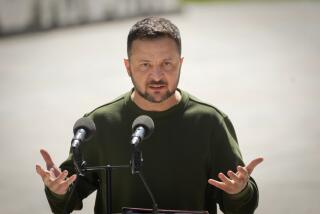Ex-Spy Resigns Polish Intelligence Post
- Share via
WARSAW — Marian Zacharski, the newly appointed chief of Polish intelligence, stepped down Thursday after an international outcry arose over his past as a top Cold War spy who stole military secrets from the United States.
“Throughout my life, I was always led by what was good for Poland,” he said in a resignation letter. “I do not want to be the cause of conflict among Poles at a moment when Poland most needs agreement and harmony.”
His decision to quit less than a week into the job was greeted with relief by Polish officials, who had come to fear his controversial appointment would undermine Poland’s campaign to join the North Atlantic Treaty Organization, the alliance Zacharski sought to subvert as a Soviet Bloc spy in the 1970s.
NATO forces are scheduled to participate in joint maneuvers in Poland for the first time next month under the alliance’s “Partnership for Peace” program, making the furor over Zacharski’s appointment all the more awkward for both sides.
“I only hope this incident will not adversely influence the American Congress and President Clinton in regards to helping Poland militarily,” said Krzysztof Krol, who heads the Confederation for an Independent Poland in Parliament’s lower house.
President Lech Walesa, who Wednesday called for Zacharski to quit, would not comment Thursday. Under an informal arrangement with the government, Walesa has responsibility for the Interior Ministry, which includes the intelligence service.
A top aide to Walesa said the president was not consulted about Zacharski’s appointment, an assertion viewed with skepticism by many lawmakers.
Either way, it was Walesa’s public rebuke of Zacharski that doomed the former spy’s short-lived tenure at the helm of the intelligence service.
Zacharski was sentenced to life imprisonment in the United States in 1981 after obtaining secret information about several highly sensitive American defense programs and passing the material to the Soviet Union. His appointment to the intelligence post was seen as an embarrassment for the United States, which still considers him a criminal.
Zacharski was able to collect data on the B-1 bomber, the F-15 fighter and Patriot air-defense missiles after successfully recruiting William Holden Bell, a radar system expert at Hughes Aircraft Co. in El Segundo. Bell provided the Polish spy with copies of documents in exchange for cash.
Zacharski returned to Poland in 1985 after an East-West spy exchange. But he received only limited clemency in the United States, meaning he would be subject to arrest and reimprisonment if he ever traveled here--even in his capacity as chief of Polish intelligence.
Few of Zacharski’s critics questioned his credentials for the intelligence post. Even Walesa praised his professionalism and experience when asking him to resign.
But Zacharski’s ties to the Communist past left many feeling uneasy about the influence of former Communists in democratic Poland. His departure was interpreted as a victory for democracy.
“In the end, the whole shocking incident will be good for Poland,” said Jan Nowak-Jezioranski, head of the Polish American Congress. “It will be seen as a warning to the old nomenclature not to try something like this again.”
More to Read
Sign up for Essential California
The most important California stories and recommendations in your inbox every morning.
You may occasionally receive promotional content from the Los Angeles Times.










